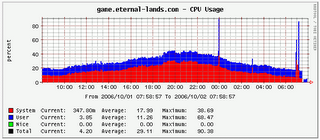Now that my laptop fixed itself, for the lack of a better term, or any clue as to what was wrong, I have an extra machine (the laptop) to play with. This is because my new desktop is much faster and better.
So I installed PCBSD, which didn't recognize my wifi card.. Great, let's try Ubuntu. Afterall, everyone says that it has a great hardware detection. Same thing..
So I went back to Mepis, version 6.0. Last year, Mepis version 3.2 recognized the wifi card, and pretty much all the devices on the laptop.
Well, it turns out that now it won't anymore. I googled around, and found out that other folks had similar problems, with their network card being recognized in the past versions, but not anymore.
Yes, I know, ndiswrapper. But to be honest, I don't really have time to do all those tricks, especially that I don't have the windows drivers for it (I'd need to reinstall windows from the rescue disk to get them). And if in the past I enjoyed hacking my computer and modifying autoexec.bat and config.sys for each game I played, now I am too old and busy for this shit.
Is it too much to expect from an OSS to actually keep their supported devices from one version to the next?
Speaking of OSS, I decided to get the latest version of Gimpshop. 2.2.8_fix1
I had a previous, older Gimpshop version, and thought that a newer version would be better, right? Turns out that this new version has a bug, it tries to read some cardreader drive, and will give a "no disk in drive" popup error every time you do something remotely useful, such as opening images, etc.
Now, some would say that I have no right to complain, because we also introduced bugs in our new versions. This is true, but we do our very best to fix them as soon as possible, so long as we know what causes them. And the bugs that make it to the final client are usually relatively minor, which is why they evade prior testing, where people can download and test the client prior to the official update.
One other other argument is that you get what you pay for. You have no right to complain if a free product doesn't match your expectations.
I usually donate money to OSS that I use. In the past I donated money to Mepis, OpenBSD, FreeBSD, FireFox, SDL, and some other software I don't even remember the name of.
But most of the people do not donate money, so their developers can't afford to work full time at their software, which is reflected in the quality of their products.
We are among the few, lucky developers that actually make some money. Most of our money doesn't come from donations, but from people purchasing items or services.
Which is why I think other OSS developers should do the same thing. For example, they can ask people to pay a certain amount of money in order for them to implement a new feature, or perhaps fix a minor bug, or port it to another platform.
In return, those who pay can get the newer version faster than those who do not pay.
The guys from
Cedega, for example, even charge a monthly subscription fee for their product, and from what I understand, they are doing pretty well, being able to hire developers that add new features, optimize stuff, fix bugs, provide some customer support..
IMO, that's pretty much the only way to be able to thrive in the everchanging world of computer software.


